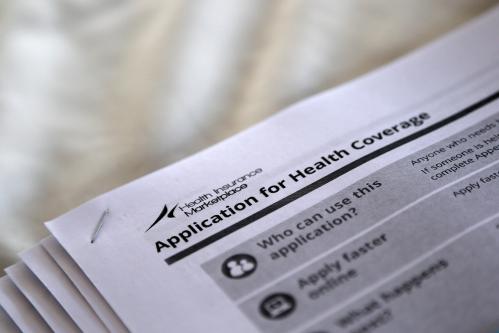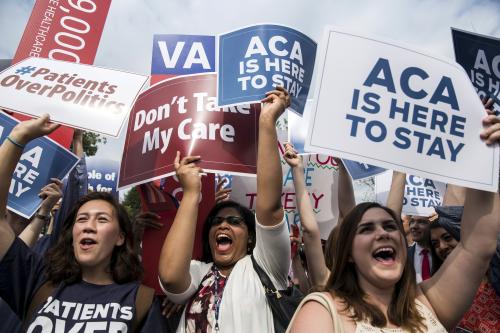As Senate Republicans work to pass their own health care bill before the July 4 recess, reports are swirling about various plans to phase out federal matching funds for the Medicaid expansion implemented under the Affordable Care Act (ACA). What are the policy implications, and what political incentives might motivate the Republican plans floating around Capitol Hill? Under any of the proposals, it is likely that millions fewer Americans would ultimately receive Medicaid coverage. At the same time, the plans may help Republican senators position themselves as moderates even as they vote for what is likely to be a highly contentious and polarizing bill.
Within states that expanded Medicaid, the federal government, under the ACA, covers at least 90 percent of the costs for providing coverage to the expansion population (adults with incomes under 138 percent of the federal poverty line). This share of the costs—referred to as the matching rate—is higher than the equivalent figure for the rest of the Medicaid population. The AHCA, the deeply unpopular bill passed by the House, would end the incentive for states to offer Medicaid to more people by eliminating the higher federal matching rate for any new expansion enrollees, effective January 1, 2020. If a state wanted to continue offering coverage to new enrollees to the expansion population, it would bear the same share of the cost as it does for non-expansion individuals.
Reports indicate the Senate has discussed two types of changes to this provision: delaying the date at which the enhanced match rate disappears, or adding a phase-out period (that is, lowering the federal match rate for new enrollees slowly over several years rather than all at once). Under both the AHCA and these possible revisions, the higher federal match rate would continue for beneficiaries who are enrolled as of whatever effective date is set as long as they are continuously enrolled in the program. Because of frequent transition in and out of the program, however, many current enrollees would lose their eligibility quickly. The Congressional Budget Office (CBO), for example, projects that states would receive the enhanced matching rate for fewer than five percent of the Medicaid expansion enrollees by the end of 2024.
According to a report by the Center on Budget and Policy Priorities (CBPP), the Senate revisions to the AHCA that include either phasing out the Medicaid expansion or delaying its repeal would not alter this fundamental dynamic; states would no longer receive the higher matching rate for almost all low-income adults currently enrolled in the Medicaid expansion at the end of the repeal period. Without the higher federal matching rate, states would need to provide the funds themselves to sustain coverage for new expansion enrollees. Anticipating the potential difficulty of doing so, eight states that expanded Medicaid coverage under the ACA also adopted requirements that reduce or eliminate the Medicaid expansion if the federal matching rate drops below the level specified in the ACA.
From a policy standpoint, it appears likely that the changes under consideration by the Senate will produce the same outcome as the AHCA—a near-complete elimination of the higher matching rate for newly eligible Medicaid enrollees. Why bother changing the provision at all, in that case? One possibility is that Republican senators from expansion states are motivated to ease their constituents’ potential concerns by delaying the repeal. Of the 20 Republican senators from expansion states, 18 must run again in either 2020 or 2022. A delay or phase-out, then, could shift some or all of the negative effects past their next campaign.
Importantly, this logic assumes that the people who would be hurt most by eliminating the expansion would turn out to vote to punish legislators for their positions. A long line of political science research suggests that “policies can make politics,” but the picture for Medicaid specifically is a complicated one. Work by Jamila Michener on the effects of Medicaid prior to the ACA-initiated expansion finds that Medicaid beneficiaries are less likely participate in politics than similarly situated individuals who do not participate in the program. Two other studies—one by Joshua Clinton and Michael Sances and one by Jake Haselswerdt—suggest that the ACA’s Medicaid expansion had a short-term, positive effect on political participation among new beneficiaries. In the former study, however, the increased engagement comes primarily in the form of higher voter registration, with weaker effects for voter turnout. And in the latter, increases in voter turnout associated with the expansion appear to have been among both new beneficiaries and conservative voters who objected to the more generous program. If beneficiaries are simply less likely to participate in politics, or if the past positive effects of the expansion are confined to registration, senators may not need to worry about electoral punishment from those actually losing benefits. At the same time, if the expansion mobilized voters who opposed the law as well as those who benefitted from it, these voters may reward their senators for repealing the expansion.
A second possibility is that governors are pushing for the delayed repeal, either because they do not want to deal with the effects on their state budgets, or because they fear their own electoral consequences. As we discussed in January, however, the evidence from political science on whether voters would blame their governors for repeal—an action taken by Congress—is mixed. In addition, of the 16 Republican governors currently leading expansion states, five will be ineligible to run for re-election in 2018 and thus would not have to deal with the consequences of repeal. (This includes New Jersey’s Chris Christie, who is term-limited this year). An additional four governors would, thanks to term limits, be ineligible to run again after a January 1, 2020 implementation date. As a result, they would not stand for re-election in a post-repeal world. For only about half of Republican governors in expansion states, then, would delayed or phased out repeal likely improve their personal political fortunes.
In the end, the delay and phase-out plans may not reflect fear of direct electoral punishment from the people most hurt by eliminating the expansion. Rather, it may reflect savvy positioning by Republican senators to appear more moderate in the eyes of other constituents with whom the Senate bill might be unpopular. If the final bill passes with a phase-out plan, Republican senators will have successfully forged ahead with repeal and replace, but states will likely face difficult decisions down the line: either find a way to fund the expansions without the increased federal matching rate, or provide Medicaid coverage to many fewer people.










Commentary
Repeal and phase out? Senate proposals on Medicaid expansion funding
June 15, 2017